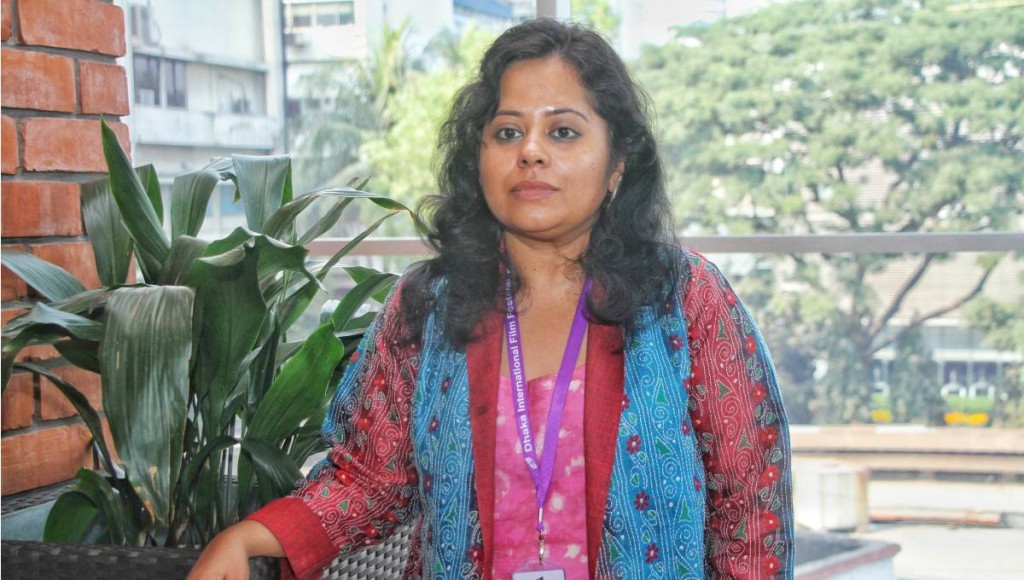For award-winning filmmaker and film historian Dr Debjani Halder, films are everything. Filmmaking is her passion and she says she feels incomplete without it. “Film is the highest medium of the communication,” she told UNB in an interview.
Debjani has authored several monographs and articles and recently, received fellowship from Indian Institute of Advanced Studies Shimla, where she will work on Art Artist and Social Life: A Critical Look at Indian Parallel Cinema (1950s to 1980s).
She has made a number of documentaries on diverse topics and subjects. In 2000, she made a documentary, ‘Darken Lives’, on prostitutes. Six years later, she came up with ‘Transition’, focusing on the political violence in West Bengal. Then, in 2007-8, she made ‘Water sentenced’ on the privatisation of water.
Her other works include ‘Documenting Agony Ritwik’ on neorealist Indian filmmaker Ritwik Ghatak, and ‘The Dark’ (2012-13) on the mining workers in ECL area.
Debjani, an independent filmmaker from Kolkata, presented a paper –
Body is not her own: Patriarchy: Violence and prostitution in Post Nineties none mainstream Cinema: A Critical Feminist Approach Key Words: Body, Sexuality, Violence and Indian Cinema – at the ‘Fifth Dhaka International Conference on Women in Cinema 2019’.
It was held at the Gallery of Alliance Francaise de Dhaka on January 11 and January 12 as part of the Dhaka International Film Festival 2019.
UNB recently interviewed the film director. Following is the excerpt:
Why do you focus deeply on social issues in your films?
I completed my Honours in History but did masters and PhD in films. I love to make films though my academic education was different. It is a plus point for me to think deeply about social problems. I always try to study contemporary social economy and political scenario before making any film.
As my main emphasis is to make parallel cinema, these films are made focusing on social issues. I stressed sociology and history together. So it helps me to think deeply on the issues.
What are the major challenges in making parallel cinema?
Raising fund is one the major challenges for making non-mainstream films. No matter how much realistic films we produce, whenever you ask producers for fund, they first consider the market value of the film and how much they can make from it.
The producers have some expectations. They want money in return and compromise in the scripts. Since I am used to practicing different type of genre in filmmaking and not interested in compromising with philosophy and ideology, I have to wait for government fund and organisations that encourage the way of parallel filmmaking.
So, it is difficult for me to produce documentary every year [but] I believe it is not a problem for me to wait two or three years for producing a good film.
Do various social problems, such as gender discrimination and sexual violence, influence your film scripting?
Filmmakers who initially started depicting social, contemporary and gender issues, sexuality and social crisis in their films faced many problems. Sometimes they were criticised but the situation has recently changed.
Many filmmakers are now focusing on social crisis. Now, feminism has influenced the way of thinking in filmmaking. Some films focus on prostitution, sexuality, and violence. But the producers ultimately want the return of their investment.
This is our success that social crisis and sexuality are at least discussed. Now many spectators also want to think and discuss these issues.
How do you deal with your challenges?
There are many challenges. Two of them are: first, when I start thinking out of the box and approach for finance. I face the second one working as a women director.
Filmmaking is my passion. So I think my life is incomplete without filmmaking. I do not consider film as an entertaining thing; it is the highest medium of communication.
Reading books, newspaper, and stories are not enough to present what problems I want to depict. Film is much more effective way of communicating the issues.
Can you explain the audience reactions and reception of your films?
A stereotypical thought about documentary and short films is that they are not entertaining and that the audience completely refutes these types of realistic films.
These films are not screened in multiplex or halls. When I submitted this at any film festival around the world, I saw the audience taking them very seriously. They can connect themselves with the theme. This is the scenario of a section of the audience.
But when these films were screened for the general people, they could connect with [the work] as I tried to focus on their problem and reality. Our crisis is that we create stereotypes and typical division about the films. We also do not knock at the door of the audience with our films properly.
source: UNB




